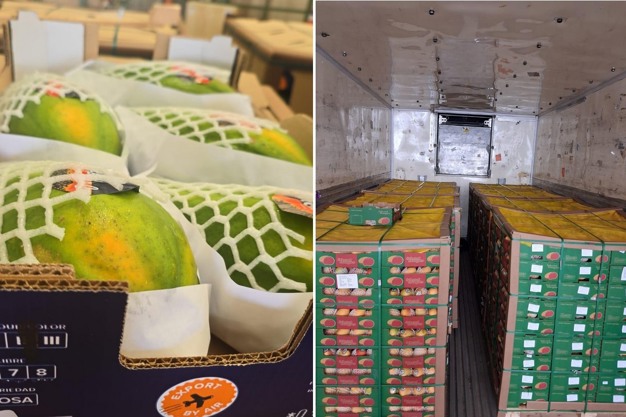Brazilian fruit exports are facing various challenges, including a lack of refrigerated infrastructure, high internal logistics costs, and delays in certifications, which are having an impact on both quality and competitiveness.
The company Hevile, based in Brazil and with more than 27 years of experience in international logistics, has positioned itself as a shipper of perishable products. Although it doesn’t export directly, it plays a key role as a logistics operator, allowing Brazilian fruit to reach international destinations such as Europe. “We handle all the maritime and air logistics from the farm until the airport or port, including customs clearance,” says Vinicius Wanderley Campos, the company’s executive director.

The company handles around 1,000 tons a month, with papayas and mangoes accounting for the largest volume in its portfolio. They also work with more delicate fruits, such as figs, atemoya, avocado, pitaya, and lychee, although in smaller quantities. “Figs are probably the most delicate fruit we handle, but the biggest volumes undoubtedly correspond to papaya and mango,” says Vinicius.
“In a country as large as Brazil, the concentration of international flights in the Rio-São Paulo belt represents a great logistical challenge. A large part of the fruit production is located in the northeast, which means long road journeys are required. It takes three days of road transport to reach the main airports, such as Guarulhos or Campinas, which increases costs and delivery times, as well as the risk of quality loss. Furthermore, the poor refrigerated infrastructure at several of the country’s main airports makes it extra difficult to avoid cold chain breaks,” he says.
 Another critical aspect is the shortage of inspectors from the Ministry of Agriculture, which delays the issuing of phytosanitary certificates and directly affects the scheduling of shipments. In the case of air transport, Hevile has contracts with the main airlines that allow it to secure space and get preferential rates for fruit exporters. As for maritime logistics, the picture is quite similar to the global one, with delays in port calls and port omissions. “Despite these difficulties, we have managed to maintain sustained growth, thanks to a personalized service and a team that operates 24 hours a day, seven days a week,” he says.
Another critical aspect is the shortage of inspectors from the Ministry of Agriculture, which delays the issuing of phytosanitary certificates and directly affects the scheduling of shipments. In the case of air transport, Hevile has contracts with the main airlines that allow it to secure space and get preferential rates for fruit exporters. As for maritime logistics, the picture is quite similar to the global one, with delays in port calls and port omissions. “Despite these difficulties, we have managed to maintain sustained growth, thanks to a personalized service and a team that operates 24 hours a day, seven days a week,” he says.
The company relies on technology as a tool for improvement, investing in traceability systems and real-time visibility. “Our portal allows customers to consult documents and monitor their shipments without the need for emails. Moreover, we have integrated Power BI tools so they can analyze their data strategically,” he says.
Among the recommendations given to exporters, Hevile stresses the importance of planning. “It’s ideal to have an annual or monthly schedule of shipments. This allows us to negotiate more competitive slots and rates with airlines and shippers,” he says.
Looking to the future, Vinicius mentions a great opportunity: the recent opening of the Chinese market for Brazilian grapes. “We are preparing the logistics to be able to meet this market’s demands. Our experience in mango shipments to Korea will be essential in this new project,” he says.
 For more information:
For more information:
Vinicius Wanderley Campos
Hevile
Tel.: +55 81 98226 1645
[email protected]
www.hevile.com.br
Source: The Plantations International Agroforestry Group of Companies
